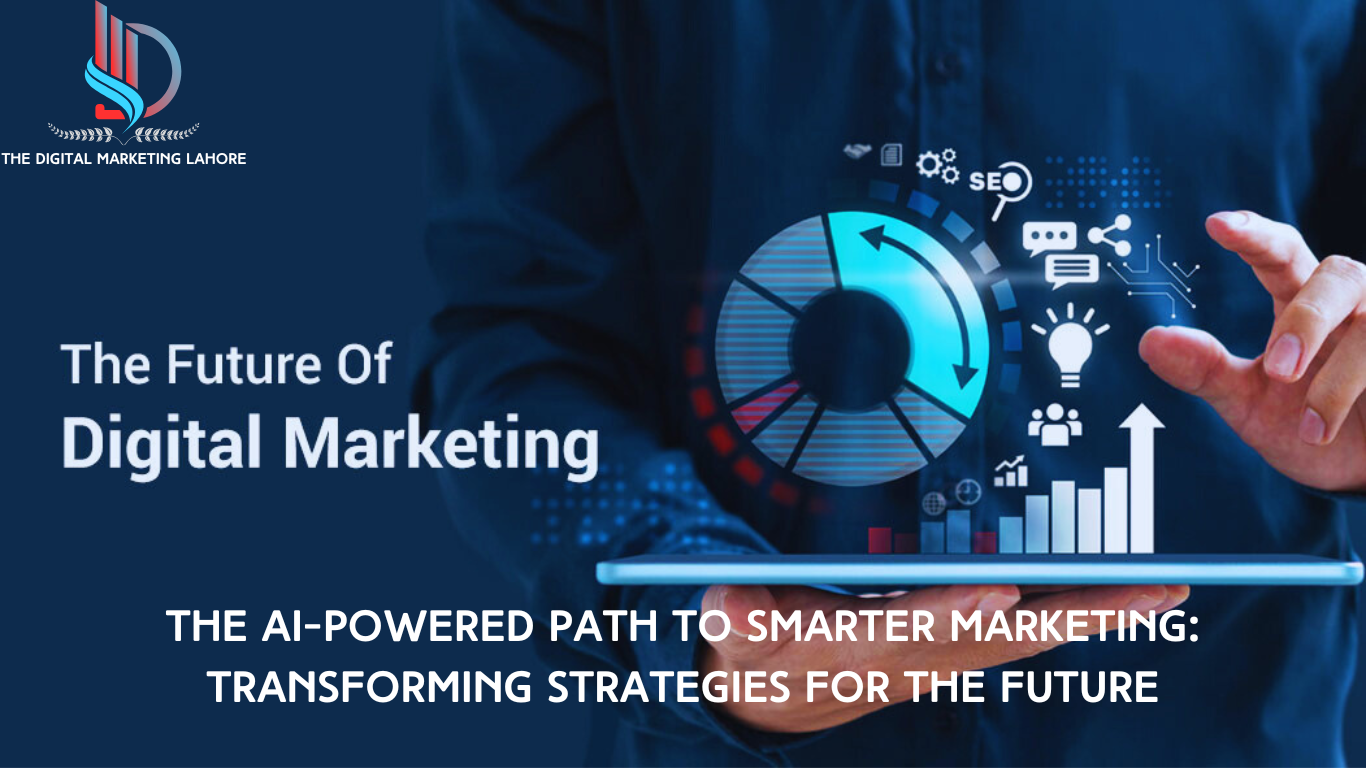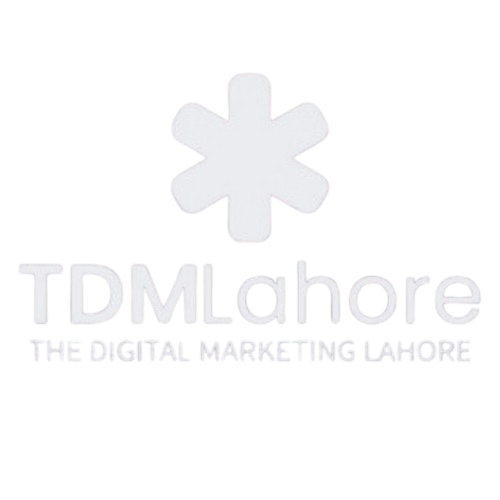
The AI-Powered Path to Smarter Marketing: Transforming Strategies for the Future
Driven by the transforming potential of artificial intelligence (AI), the marketing terrain is changing with explosive pace. Companies are using artificial intelligence today to improve their plans, streamline procedures, and provide more customized experiences. TDM Lahore Digital Marketing Agency investigates in this paper how artificial intelligence is changing the direction of marketing and the chances it offers for companies eager to welcome this creative technology.
1. Knowing AI in Marketing
In marketing, artificial intelligence (AI) is the use of data-driven technologies, algorithms, and machine learning to simplify, improve, and maximize marketing initiatives. It personalizes client interactions, forecasts consumer behavior, and automates repetitive operations.
Main Advantages of Artificial Intelligence for Marketing:
- Efficiency: Automating manual labor helps to lower it.
- Personalization: Events for certain clients.
- Scalability: Managing more datasets for better decision-making is scalability.
- Predictive Analytics: Knowledge of future patterns and behaviors
Effective integration of artificial intelligence by marketers allows them to use strong insights to keep ahead of the competitors.
2. How Artificial Intelligence is Changing Approaches of Digital Marketing?
In several spheres of digital marketing, artificial intelligence is transforming conventional tactics and allowing wiser solutions by changing established practices.
A. Better Customer Segmentation
Through demographic, behavior, and preference analysis, artificial intelligence lets companies more accurately segment markets. It helps businesspeople to:
- Start focused campaigns.
- Make dynamic material catered to certain client requirements.
- Cut lost advertising expenses.
B. Better Decision-Making Predictive Analytics
AI projects patterns, behaviors, and campaign results using past data. For instance:
- E-commerce systems can forecast anticipated sales of certain items.
- Marketers may estimate CLV, or client lifetime value.
C. Real-time customizing
Artificial Intelligence gives in real time and adjusts material. Like this:
- Netflix bases program recommendations on watching behavior.
- E-commerce sites use browsing behavior to propose items.
3. AI-Driven Instruments Changing Marketing
The development of artificial intelligence has brought strong instruments changing marketing approaches. Here are some important tools powered by artificial intelligence:
A. Virtual assistants and chatbots
AI-powered chatbots help users along their buying route, answer enquiries, and provide 24/7 customer support. Among such are:
- ChatGPT provides conversational help.
- Virtual assistants engaged in client interaction include Alexa and Siri.
B. Targeting Predictive Ad Targets
By spotting the optimal audience categories, channels, and time to distribute adverts, artificial intelligence maximizes advertising efforts. Higher ROI platforms such Google Ads and Facebook Ads use artificial intelligence.
C. Optimization of Content Creation
Through analysis, artificial intelligence enables marketers to produce and polish materials.
- SEO related trends and keywords.
- Measures of user involvement for improved narrative.
Tools like Grammarly and Jasper help create excellent, search engine optimized materials.
4. AI-Driven Marketing Automation
The influence of artificial intelligence on marketing is mostly related with automation. AI helps companies to handle monotonous chores therefore freeing resources for innovative ideas.
A. Automaton Email Marketing
Email systems driven by artificial intelligence personalize subject lines, content, and send timings for higher open and click-through rates. AI is used by Mailchimp and HubSpot among other tools to maximize email marketing.
B. Social Media Management
AI solutions like Hootsuite Insights and Buffer examine audience behavior, recommend ideal publishing times, and provide social media performance reports.
C. Integration of CRMs
Through insight into consumer preferences and buying patterns, artificial intelligence improves customer relationship management (CRM) platforms such Salesforce.
5. Marketing Ethical AI Challenges
Though promising, artificial intelligence in marketing presents issues for companies that have to be resolved.
A. Privacy Issues in Data
User data is essentially what drives artificial intelligence. To foster confidence, marketers have to guarantee adherence to privacy regulations like GDPR and CCPA.
B. Algorithmic Biases
Unintentionally reflecting biases in their training data, artificial intelligence systems Frequent audits and open procedures help to prevent moral hazards.
C. Managing Human Touch Against Automation
Although automation increases productivity, depending too much on artificial intelligence might turn off clients. One must find the proper mix between automation and personal contact.
6. AI-Driven Marketing Future Trends
Marketing’s AI revolution is far from over. These tendencies will help to define the future:
A. Voice Search Enhancement
Optimising for voice search is becoming more important as voice assistants find increasing usage. Companies have to give conversational keywords and local search searches top priority.
B. Extremely Customized Events
By weighing complex consumer data including sentiment and intent, artificial intelligence will keep improving personalization.
C. Artificial Intelligence (AR) and Integration
Combining artificial intelligence with augmented reality creates immersive events. As a matter of fact:
- Virtual fashion and cosmetic industry try-ons.
- AR-powered property tours.
D. AI-Driven Influencer Marketing
In influencer marketing, AI algorithms may find real-world influencers, project campaign performance, and track ROI.
7. Why Should AI Matter to Your Company?
Including artificial intelligence into marketing is about flourishing in a digital environment growingly competitive, not just about being relevant.
Reasons to Accept Artificial Intelligence
- Automating repeated chores saves money and time.
- With better, data-driven advertising, increase income.
- Provide first-rate customer experiences that build loyalty.
AI helps companies to convert data into useful insights, therefore fostering development and creativity.
Red altering how companies interact with their consumers the AI-powered route to better marketing is redefining From predictive analytics and tailored experiences to automation and ethical behaviour, artificial intelligence presents endless opportunities to change future directions of strategy. Adopting artificial intelligence can help your company not only keep ahead of the curve but also create significant, long-term bonds with its consumers.
FAQs
1. In what ways may artificial intelligence improve marketing consumer experiences?
By customizing interactions, forecasting requirements, and offering real-time solutions—which generates a smooth and interesting journey—AI enhances consumer experiences.
2. Which well-known artificial intelligence applications are available to marketers?
Marketers extensively utilize tools include Mailchimp for email automation, ChatGPT for content production, and Hootsuite for social media management.
3. Is artificial intelligence fit for marketing small companies?
True! Small firms would find AI solutions such as chatbots and email automation very affordable and scalable.
4. How may artificial intelligence fit into predictive analytics?
By use of historical data analysis, artificial intelligence forecasts consumer behavior, future trends, and campaign results, thereby guiding marketers in their choices.
5. How may companies handle moral dilemmas in artificial intelligence marketing?
To properly handle ethical issues, companies should guarantee data privacy, eliminate algorithmic biases, and strike a mix between automation and human interactions.




